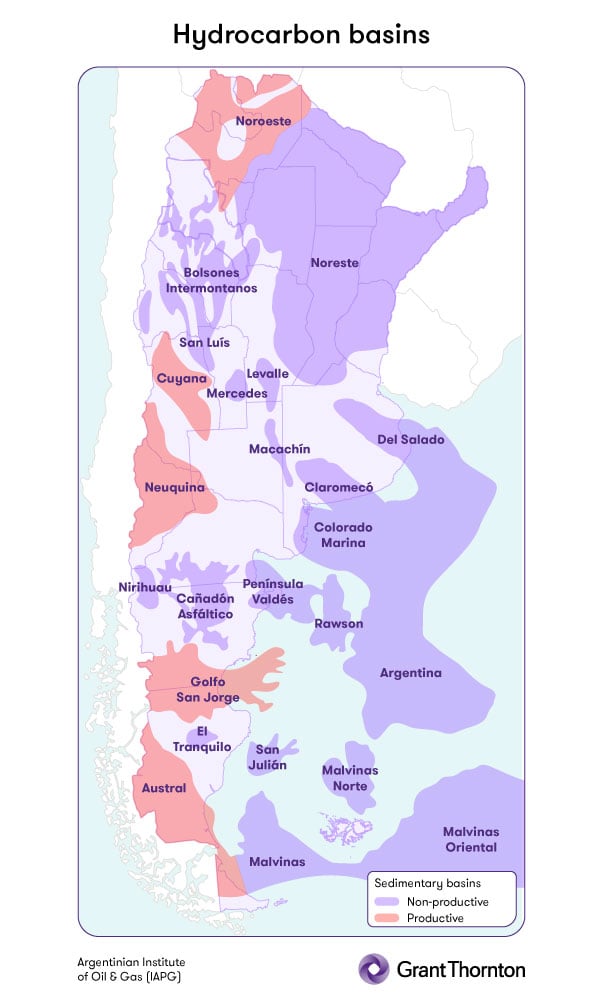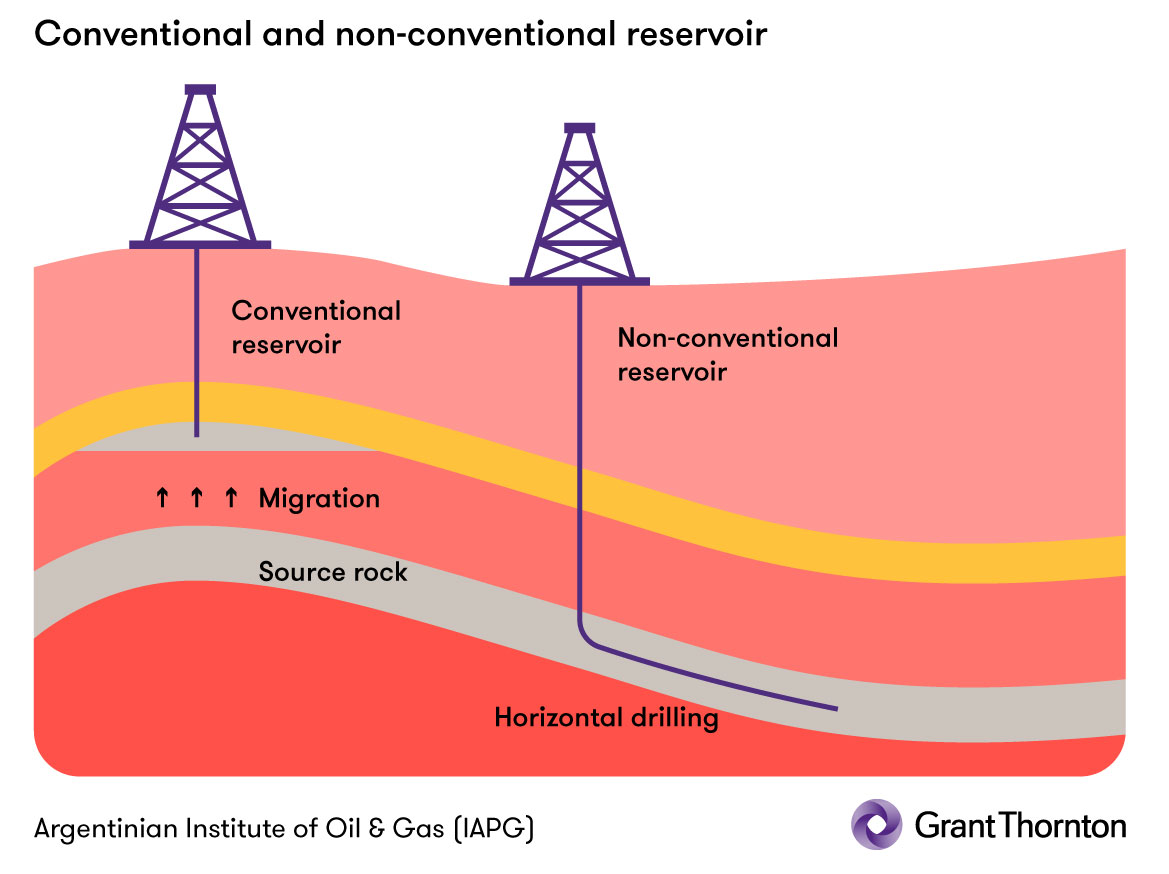
The industry in Argentina
 The Argentine extractive industry is essential for the economic growth, energy security and social development of the region. Although we are experiencing an energy transition towards decarbonization, there is still a great dependence on hydrocarbons and other fossil fuels and global oil demand is expected to increase by 2045, reaching a maximum of 1.10 mb/d (million barrels per day).
The Argentine extractive industry is essential for the economic growth, energy security and social development of the region. Although we are experiencing an energy transition towards decarbonization, there is still a great dependence on hydrocarbons and other fossil fuels and global oil demand is expected to increase by 2045, reaching a maximum of 1.10 mb/d (million barrels per day).
Argentina has the second largest reserve of unconventional gas (located in the source rock) and the fourth largest reserve of oil of the same source. In fact, the national primary energy mix is made up of 55% natural gas, 33% oil, 5% bioenergy, 4% hydroelectric energy, and 3% nuclear energy.
In the country we have 24 sedimentary basins, of which 5 (Golfo de San Jorge, Neuquina, Austral, Noroeste, Cuyana) began to be exploited between 1907 and 1949. Between January and September 2023, 9.7 million additional barrels of oil were produced, a growth of 6.12% compared to the same period in 2022.
What are hydrocarbons?
Hydrocarbons are the simplest organic compound that exists and the most demanded non-renewable energy source. They form in certain rocks (called source rocks), that are exposed to high temperatures (between 60°C and 200°C) and pressure for long periods of time. Depending on the level of permeability of the rocks in which the resources are stored, we can talk about conventional resources (they migrate to a reservoir rock) or non-conventional resources (they remain in the source rock).

These can be extracted in solid (methane hydrate or heavy oil), liquid (petroleum) or gaseous (natural gas) state. They are highly unstable and, especially in hot, dry environments, can easily combust. When fossil fuels undergo spontaneous or induced combustion, they emit polluting gases such as sulfur dioxide and nitrogen oxides, sulfates and greenhouse gases. It is for this reason that they are not considered clean energies.
Hydrocarbons and sustainability
When thinking about the role of hydrocarbons on the path to sustainability and the net zero goal, we must do so from the point of view of production and use.
 “Our country has a history of being at the forefront of energy developments, especially in oil and gas,” says Gabriel Righini, Audit Partner and spokesperson for the ‘Energy and Natural Resources’ industry at Grant Thornton Argentina. “The demand for hydrocarbons will continue, but in the coming years the trend will reverse and renewable energies will have greater demand. To remain competitive, the hydrocarbons will need to be produced economically and with low emissions.”
“Our country has a history of being at the forefront of energy developments, especially in oil and gas,” says Gabriel Righini, Audit Partner and spokesperson for the ‘Energy and Natural Resources’ industry at Grant Thornton Argentina. “The demand for hydrocarbons will continue, but in the coming years the trend will reverse and renewable energies will have greater demand. To remain competitive, the hydrocarbons will need to be produced economically and with low emissions.”
Natural gas is the “cleanest” fossil fuel. Its burning produces 50% less CO2 emissions than coal and 30% less than oil. “This low emission positions gas as a key factor in the energy transition. Currently, renewable energy production is not enough to meet demand. This is why gas could make up for the energy deficit without leaving such a significant carbon footprint,” Righini points out.
Another advantage of natural gas as an energy source is that its use (instead of other fuels) allows to:
- Improve air quality
- Reduce air pollution
- Promote energy efficiency (by releasing more energy when burned)
- Be easily transported and stored
On the path to a carbon-neutral matrix, hydrocarbons should not be considered only for energy generation, since they are also used to produce synthetic rubber, pharmaceutical products, fertilizers, plastics, synthetic detergents, among others. The processes to obtain the polymers used in these activities emit a large amount of greenhouse gases (GHG). Developing green catalysts is essential. “Not all petroleum products have a natural substitute. The adoption of low-carbon measures in the refining process is an important step,” concludes Righini.
Industry projections
The International Energy Agency (IEA) estimates that in 2030 the global oil consumption/demand ceiling will be reached, but that by 2028, production will increase to 5.8 mb/d. In the national industry, they project production that will reach one million barrels per day in 2026, which will allow exports to exceed 500,000 bpd. By 2024, global oil production is expected to increase by 1.24 mb/d, ahead of global demand growth which is expected be 1.2 mb/d (47.83% lower than in 2023).
 According to data from the National Secretariat of Energy, during the third quarter of 2023, oil production was 629,000 bpd, mainly from unconventional sources. "The works in execution and projected will increase transportation capacity, allowing not only greater production, but also an increase in crude oil exports," highlights Estanislao de León, Audit Partner and spokesperson for the 'Energy and Natural Resources' industry at Grant Thornton Argentina.
According to data from the National Secretariat of Energy, during the third quarter of 2023, oil production was 629,000 bpd, mainly from unconventional sources. "The works in execution and projected will increase transportation capacity, allowing not only greater production, but also an increase in crude oil exports," highlights Estanislao de León, Audit Partner and spokesperson for the 'Energy and Natural Resources' industry at Grant Thornton Argentina.
Following the environmental trend, global production of natural gas will grow by around 30% by 2050 and liquefied natural gas (LNG) will increase by 3.4% per year until 2035. “Looking forward, Argentina is in a good position that will allow to satisfy its internal demand, while commercialising with other countries. Although gas exports in 2022 increased by 366% compared to 2021 and were US$741 million; the opening of the ‘Presidente Néstor Kirchner’ gas pipeline and greater investments in the industry could further boost production and position Argentina in the LNG market,” concludes Estanislao de León.